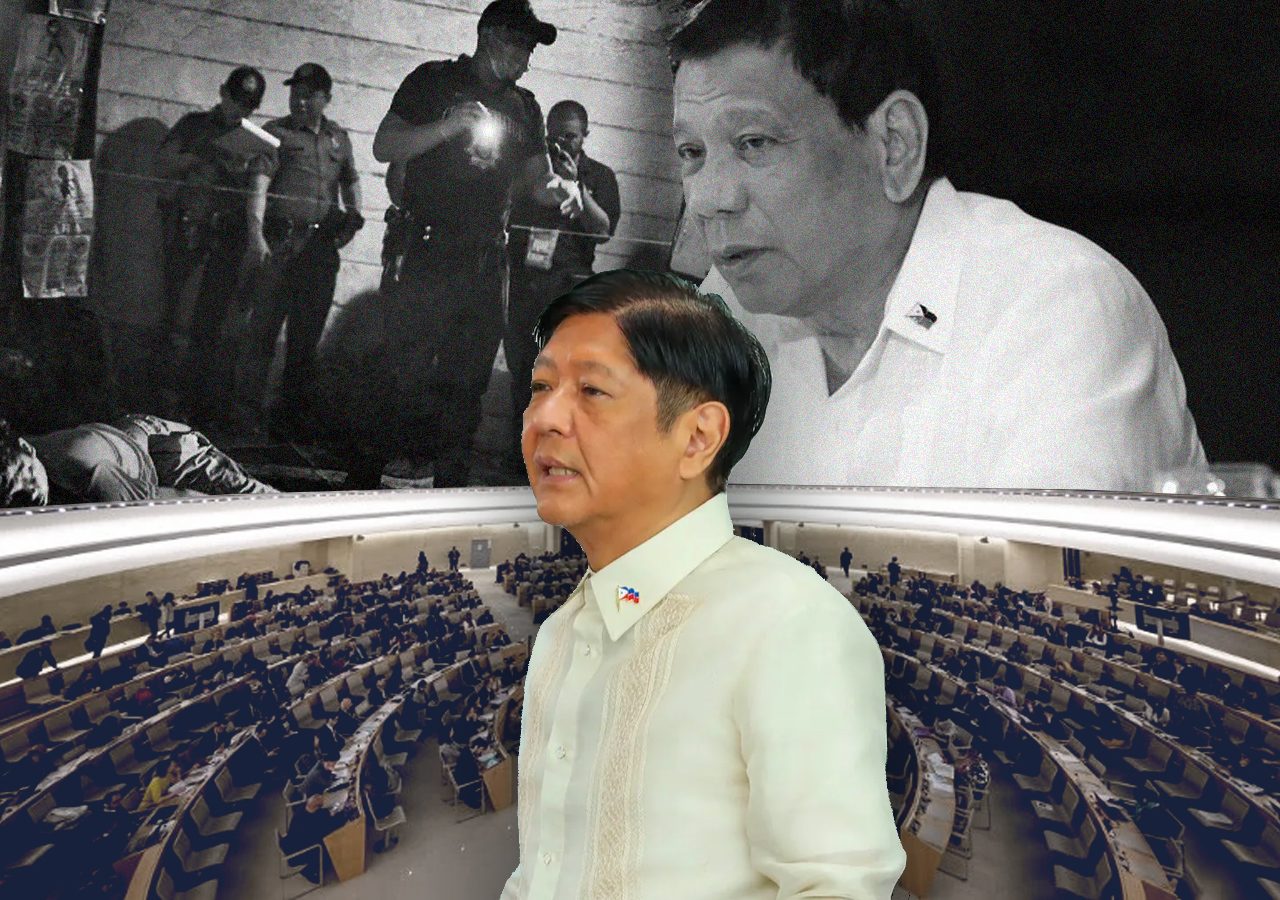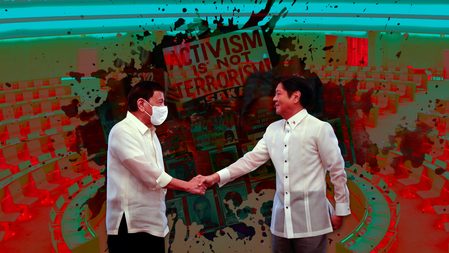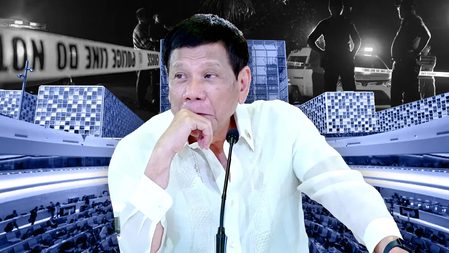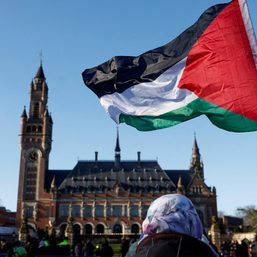SUMMARY
This is AI generated summarization, which may have errors. For context, always refer to the full article.

THE HAGUE, The Netherlands – All eyes will be on the United Nations Human Rights Council (UN HRC) again as it will soon assess the human rights record of the Philippines left damaged by the culture of impunity under former president Rodrigo Duterte.
The Philippines on November 14 will go through the Universal Periodic Review (UPRC), a process where 47 UN HRC member states are expected to scrutinize and make recommendations to address various human rights situations. The country last underwent this procedure in 2017 – less than a year into the Duterte administration. (READ: FAST FACTS: Get to know the UN Human Rights Council)
Now that Duterte has left office, Filipino human rights groups are hoping that the council sees past the “charm diplomatic offensive” of President Ferdinand Marcos Jr. and his administration and focus on the “gross lack of justice and accountability” in the country.
They urge the UN body not to give the Marcos administration a clean slate when it comes to human rights.
“It is possible that the Marcos Jr. administration may try to evade accountability by feigning ignorance of the significant, pressing and outstanding human rights issues and concerns,” Cristina Palabay, Karapatan secretary-general and head of the Philippine UPR Watch delegation said.
“But what should be considered in the UPR is the trend of states’ compliance to their obligations under international human rights treaties, and the indicators on the current administration’s policies and actions,” she added.
Marcos’ responsibility
Official numbers alone already show the extent of the human rights crisis the Duterte administration left behind, and what the Marcos government needs to address.
Data from the government show that at least 6,252 individuals were killed in police anti-drug operations between July 2016 and May 31, 2022, a month before Duterte’s term ended. This number does not include those killed vigilante-style, which human rights groups estimate to be between 27,000 to 30,000.
Out of this death toll, only one incident has led to a conviction so far – the case of 17-year-old Kian delos Santos. In October, Justice Secretary Jesus Crispin Remulla vowed “real justice in real time” but there still has been no significant development in the much-touted drug war review panel initiated by the Department of Justice in June 2020.
Aurora Parong, Philippine Alliance of Human Rights Advocates (PAHRA) national executive member, said the UN HRC should see that the Marcos government’s rhetoric on human rights “is hollow as public statements and actions in the country belie them.”
For example, the leadership of the Commission on Human Rights – mandated by the 1987 Philippine Constitution to investigate state abuses – is still incomplete with only a chairperson and one commissioner appointed. Marcos also said he has no intention of rejoining the International Criminal Court (ICC) after Duterte withdrew the country’s membership in 2019.
“The current administration inherits the consequences shaped by the atrocities of the previous one and has the human rights obligation to provide remedies and reparation as well as deliver justice by making those responsible for the killings and other human rights violations accountable,” Parong said.
“If not, the Marcos government will become accessory to the crimes against humanity such as murder and other human rights violations committed under the past government by enabling escape of past and current government officials from accountability,” she added.
The upcoming UN review comes amid widespread criticism of UN HRC’s weak action against widespread human rights abuse and lack of justice in the Philippines. The most it has done is to offer technical assistance to the Philippines, instead of an investigation into documented killings under the Duterte administration.
A September 2022 report by the UN Office of the High Commissioner for Human Rights (UN OHCHR) highlighted several issues that contribute to a “very limited” access to justice by victims of abuse in the country. The council also failed to act on the findings of this report.
“The UN HRC has failed to help protect people in the Philippines from the very people who should be protecting them, the law enforcement agents and the high officials in government,” Parong said.
“These decisions of the UN HRC have helped diminish the ray of hope for justice through international mechanisms and processes at the global level and have failed the victims’ families, civil society organization and others who value human rights,” she added.
Go beyond rhetoric, propaganda of Marcos
Human Rights Watch (HRW) senior Philippine researcher Carlos Conde said the UN HRC member states should be more discerning about what the Philippine government has to say about the situation in the country, even if at its core, the council is a “political body.”
“UN HRC member states should avoid falling into the trap of thinking that since Marcos is new, that since he is not Duterte, that since he has promised to be committed to human rights, he must be okay, that things have actually improved [because] well, they have not,” he said.
“Until, for instance, the Philippine government stops the persecution of Maria Ressa, of other journalists, until they release [former senator] Leila de Lima, until Marcos declares an end to the violent drug war, until the attacks against CSO [civil society organization] actors end, until red-tagging stops – it’s all rhetoric, it’s all propaganda,” Conde added.
There is no shortage of credible documentation of the culture of impunity in the Philippines that can counter the narrative of the Marcos administration. Human rights groups have been constantly submitting to the UN HRC and other international mechanisms their reports on the killings and other human rights violations.
This reality is not lost on UN HRC member states. HRW’s Conde recalled that, during an interactive dialogue he attended during the 51st session of the council, many member states condemned the abuses in the country but did not follow through with any action.
“[UN HRC member states] who really value human rights need to take a more activist approach,” Conde said. “Other states, especially those who, shall we say, have nothing to lose for pushing human rights in the Philippines, need to maximize their membership for the sake of the victims of abuses.”
A test for UN HRC
The highlight of the scheduled Universal Periodic Review would be the recommendations of member states to the Philippines, among other countries who will be placed under review during the session.
For PAHRA’s Parong, the process could be heavily improved by ensuring that countries under review are made to explain why they do not accept certain recommendations, and why they fail to make progress on previous recommendations, among other things.
“It should transform the UPR into an accountability mechanism that monitors progress and failures in human rights governance where concrete time-bound indicators of success are reported,” she said.
“This more rigorous process can help de-escalate or halt massive human rights violations and help break impunity as well as lead to progressive realization of economic, social and cultural rights and better enjoyment of civil and political rights in various countries,” Parong added.
The scheduled UPR in November will not only be a report card for the Philippines, but also be another test for the highly-criticized UN Human Rights Council.
It recently came under fire for rejecting a formal debate that would discuss the abuses against Uyghurs in China, despite a UN report that found violations that could amount to crimes against humanity.
Karapatan’s Palabay warned that at stake here is the credibility of the UN HRC and the review itself. Human rights advocates will be watching if there will more meaningful and decisive action to address the Philippines human rights situation in the face of the crisis caused by Duterte, and if the Marcos administration will do anything significant.
“It will be seen as a mere talkshop of states to prettify their sordid human rights records, and thus will render the various human rights treaties as mere paper,” she said, adding that it can’t be just business as usual for the council.
The review also comes as human rights groups and other stakeholders wait for the next development at the International Criminal Court.
ICC Prosecutor Karim Khan has insisted on resuming his probe into the drug war killings under Duterte as there have been no indications that “criminal proceedings actually have been or are being conducted in anything more than a small number of cases.”
Will the UN Human Rights Council finally listen? – Rappler.com
Add a comment
How does this make you feel?





![[WATCH] Bamban POGO scandal: There’s a bigger fish than Alice Guo](https://www.rappler.com/tachyon/2024/07/inside-track-tcard-bamban-pogo.jpg?resize=257%2C257&crop=435px%2C0px%2C1080px%2C1080px)
![[Vantage Point] China’s silent invasion of the Philippines](https://www.rappler.com/tachyon/2024/07/TL-china-silent-invasion-july-16-2024.jpg?resize=257%2C257&crop=318px%2C0px%2C720px%2C720px)







![[Just Saying] SONA 2024: Some disturbing points](https://www.rappler.com/tachyon/2024/07/TL-marcos-sona-points-july-23-2024.jpg?resize=257%2C257&crop=335px%2C0px%2C720px%2C720px)








There are no comments yet. Add your comment to start the conversation.